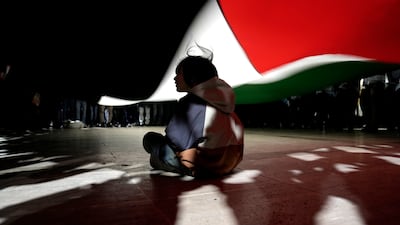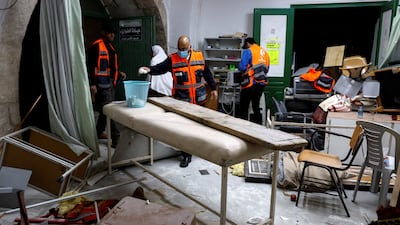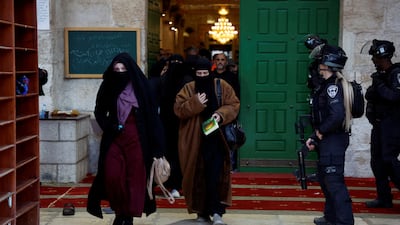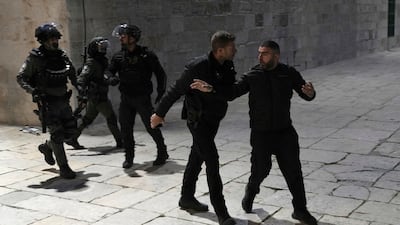Jordan has "intensified moves" to seek an end to the violence in Jerusalem, the Foreign Ministry said, after Israeli police entered Al Aqsa Mosque for a second day.
The violence during Passover and Ramadan, is whipping up religious fervour in Palestine and raising tensions between Israel and Iran-backed militant groups in the Gaza Strip. Two more rockets were fired late on Wednesday from the area towards Israel.
Jordan's foreign ministry spokesman Sinan Al Majali said the ministry has engaged in "contacts and intensified moves regionally and internationally to stop the escalatory Israeli steps".
"Israel bears full responsibility for the dangerous consequences of the continuation of the escalation," he said.
Israeli police entered the compound overnight and tried to remove worshippers, using stun grenades and firing rubber bullets, Palestinian staff at the site said.
Yossi Alpher, an author on Israeli diplomacy and a former intelligence officer, told The National there was “nothing new” about the tensions at Al Aqsa, but said the Israeli government is “not helping itself with its composition that includes extremists”.
“One thing Israel can do is improve the performance of its police. Did they have to break into to Al Aqsa for the second straight night? Couldn’t they have done something more effective to prevent these Israeli provocateurs from playing into the hands of Hamas and Islamic Jihad?
"While there’s still a capable bureaucracy in terms of dealing with our neighbours in the Foreign Ministry and the Mossad (intelligence agency), the minister of so-called national security, (Itamar) Ben-Gvir, does not have the skills or experience and is ideologically predisposed to support Jewish extremists and take a heavy hand against Arabs. That gives us one hand behind our backs.”
Mr Alpher said he believed there was an economic incentive for Hamas “not to stir the pot too much”.
“Hamas still wants to exploit this situation and win points, which is why the rockets in the past couple of days have been a pretty pathetic performance,” he said.
“If they had really wanted to make a point as defender of Al Aqsa, it would have fired rockets at my home during Passover.”
For Mr Alpher, external escalation presents more of a threat.
“There’s a greater danger of Hezbollah joining in and maybe Iran launching other provocations from Syria or by backing extremists in the West Bank, given the weakness of the Palestinian Authority,” Mr Alpher said.
Al Aqsa is managed by Jordan's religious endowments ministry, an arrangement that dates from when East Jerusalem and the West Bank were under Jordanian control, from 1948 to 1967.
Last year, efforts by Jordan and Egypt helped contain violence in Palestine that erupted over Al Aqsa, US officials who mediated an end to the violence said at the time.
The US is among many western nations that recognises Jordan's claim of custodianship over Al Aqsa, one of Islam's holiest places.
The claim dates from the 1920s, when Palestinian religious leaders gave custodianship of the shrine to Sharif of Makkah, a great-grandfather of King Abdullah, as tension mounted between Arabs and Zionist incomers to Palestine.
In Cairo, Egypt’s foreign ministry condemned the latest Israeli incursion into Al Aqsa, saying it constitutes a “blatant violation of international laws”.
"Such hateful and reprehensible scenes and Israel's repeated violations of the sanctity of the holy places ignite the feelings of anger among the Palestinians and the Islamic peoples," the statement said.
The ministry urged world powers to “shoulder the responsibility” by seeking an end to such attacks.
The UN Security Council is to meet on Thursday for an emergency session to discuss tensions at Al Aqsa Mosque.
Mr Alpher said Israel could face new challenges this time round.
“Normally, Israel would rely on the Biden administration either to prevent a Security Council discussion, which the US did about a month ago, or veto a resolution that was tabled there.
"Right now, Mr Biden has been very critical of Mr Netanyahu and made it clear that he’s persona non grata in the White House. It will be interesting to see how the Biden administration acts at the Security Council.”




















